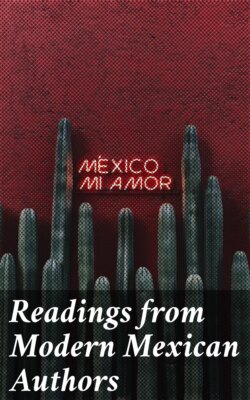Читать книгу Readings from Modern Mexican Authors - Группа авторов - Страница 20
На сайте Литреса книга снята с продажи.
AGUSTIN RIVERA.
ОглавлениеTable of Contents
Agustin Rivera was born at Lagos (Jalisco) on February 28, 1824. For a time he studied at the famous Colegio de San Nicolas, at Morelia, and, later, at the Seminario in Guadalajara. In 1848 he was licensed to practice law and in the same year took holy orders. He taught for some time at Guadalajara, and was, for nine years, the attorney of the Ecclesiastical Curia. He finally removed to Lagos, the city of his birth, where he still lives, and where his writings have been published. In 1867, he made a journey to Europe, visiting England, France, Italy, and Russia. His writings have been many, varied, and extensive; the complete list of his books and pamphlets, includes ninety-four titles. Among the best known and most widely mentioned are his Compendio de la Historia antigua de Mexico (Compend of the Ancient History of Mexico), Principios criticos sobre el vireinato de la Nueva España (Critical Observations upon the Vice-Royalty of New Spain), and La Filosofía en Nueva España (Philosophy in New Spain). Two pamphlets, Viaje á las Ruinas de Chicomoztoc (Journey to the Ruins of Chicomoztoc) and Viaje á las Ruinas del Fuerte del Sombrero (Journey to the Ruins of the Fort of Sombrero), have been widely read and are often mentioned.
Our author is vigorous and clear in thought and expression. Extremely liberal in his views, much of his writing has been polemic. In argument he is shrewd and incisive; in criticism, candid but unsparing. His Principios criticos is a scathing arraignment of the government of New Spain under the viceroys. His Filosofía is a part of the same discussion. It forms a large octavo volume. It begins with presenting two Latin documents of the eighteenth century, programs of public actos, given at the Seminario and the Colegio de Santo Tomás in Guadalajara. These serve as the basis for a severe criticism of the philosophical thought and teaching in Spain and New Spain during the vice-regal period. Testimonies are cited from many authors and Rivera’s comments upon and inferences from these are strong and original. In the course of the book he summarizes the scientific work really done—and there was some—in Mexico during the seventeenth and eighteenth centuries. He sums up his argument in eleven corollaries. Our selections are taken from the Filosofía en Nueva España and from a curious dialogue regarding the teaching of Indian languages.
On February 28, 1902, after many years of absence, Agustin Rivera was in Guadalajara; his completion of seventy-eight years of life was there celebrated by a large circle of his friends, old students, admirers, and readers, most brilliantly. In October, 1901, a proposition, that the national government should pension the faithful and fearless old man, was unanimously carried by the one hundred and twenty-five votes in the House of Deputies in the City of Mexico. It is pleasant to see these acts of public recognition of the value of a long life usefully spent.
